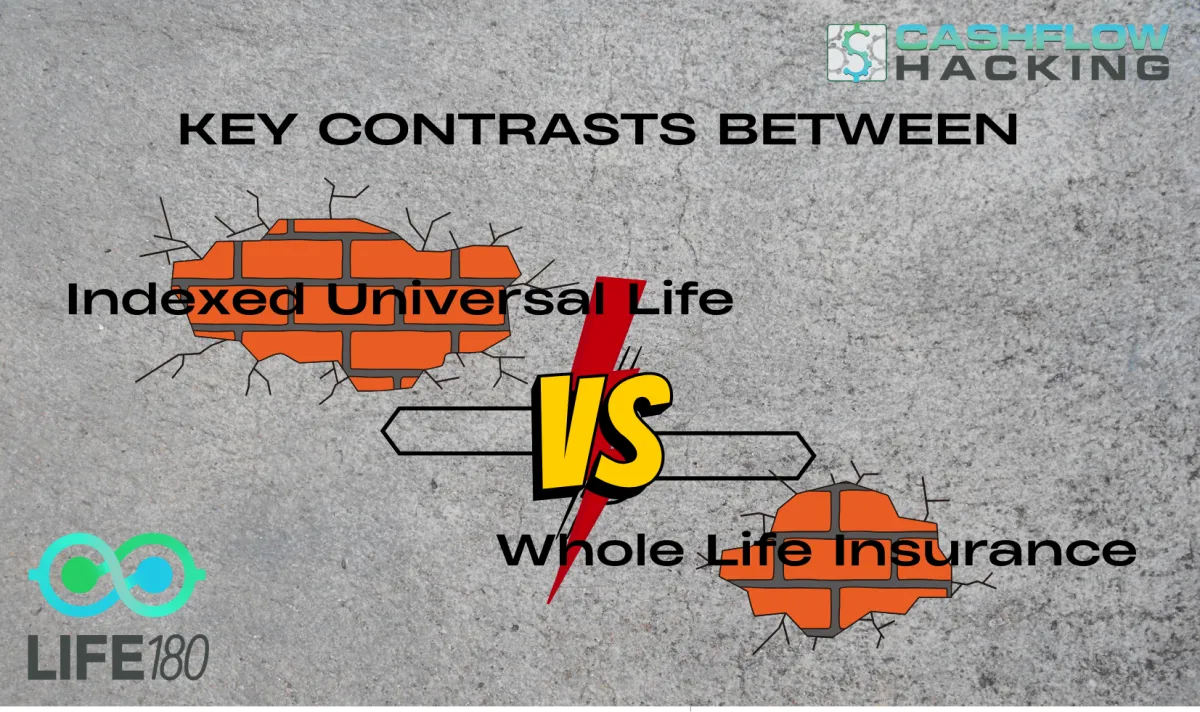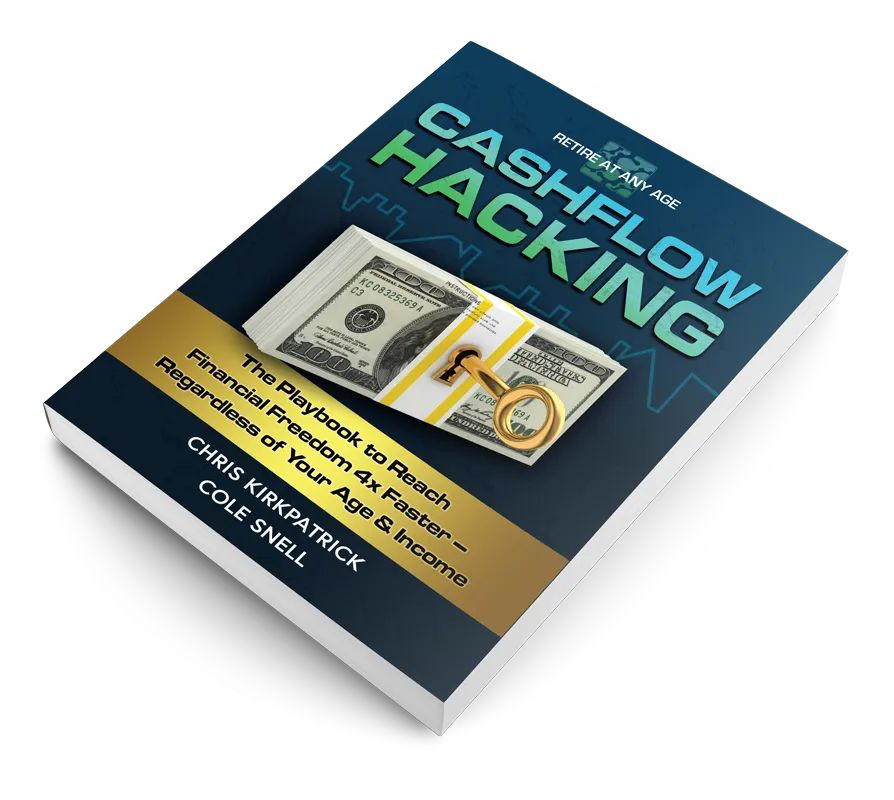
Simplifying Financial Confusion
LEARN CASH FLOW HACKING TO REACH FINANCIAL FREEDOM
Used by 90% of millionaires to reach their financial goals 4x faster

Achieve Financial Freedom Through Cash Flow Hacking

Increase Your Lifestyle While You Build Your Wealth

Position Yourself to Thrive in Market Downturn
YOU SHOULD NOT FEEL OUT OF CONTROL ABOUT YOUR FINANCIAL STRATEGY

Have easy access to your money in case of emergencies and opportunities

Use the investment strategy 90% of millionaires use

You deserve a clear plan to consistently grow your money and avoid market uncertainty

Have a guide and advisor that has your best interest in mind

Do not overpay in taxes

Stop guessing at the best vehicles to protect and grow your money

Indexed Universal Life vs Whole Life - The main difference
The following article is a transcript of the YouTube video available on the LIFE180 YouTube channel
When it comes to talking about index universal life or whole life insurance on the internet, on social media, YouTube, Tik Tok, Instagram, there's a lot of debate between which is better whole life or index universal life.
In the context of this discussion, we typically focus on the accumulation of cash value and its utilization as either tax-free income in retirement or for other investments, such as business ventures, real estate, and similar opportunities.
In this article, I'm going to discuss the single most crucial element to consider when debating between indexed universal life and whole life insurance. This primarily boils down to common sense. Therefore, once you approach this topic with common sense in mind, the decision should become a no-brainer.
I had a conversation with someone the other day, and the topic came up. They were asking, “Chris, why choose Whole Life Insurance over Indexed Universal Life Insurance?” They pointed out that when they looked at the IUL illustrations, the IUL seemed to perform exceptionally well. While the whole life insurance illustrations are good, they are decent, but when you compare them side by side, IUL wins every time, hands down, without a doubt. The reality is, that's true.
But for this article, I don't want to delve into all the numbers and the intricate details behind the scenes of both IUL, which I'm not a big fan of, and whole life insurance. Instead, I want to take a step back and approach this from a common-sense perspective. Let's consider it without diving into the complexities of insurance, viewing it more as a contractual agreement.
Contract as the Foundation
Let me put it to you like this: Suppose you were starting a business, and you had a business partner. Going into this business relationship, you would know that you need a contract. In that contract, you'd have to establish the terms, long-term responsibilities, obligations, expectations, who's managing the business, financial commitments, time investments, equity distribution, and more. While every business is unique, the same concept applies to life insurance.
Remember, whole life insurance has been around for 180 years and boasts a successful track record with participating mutual companies. What frustrates me is when IUL agents mention how Walt Disney, JC Penney, and Ray Kroc used life insurance for their businesses. While that's true, they used whole life insurance. Back in their time, indexed universal life insurance didn't even exist.
It's somewhat of a smoke and mirrors game when it comes to IUL advocates marketing their products, making it seem like these successful individuals used IUL for their financial strategies when they didn't. They try to position IUL as essentially the same as whole life insurance, but that's not accurate because it lacks the same foundational understanding.
And here's why. Let me start here: The bottom line with whole life insurance and indexed universal life is that we need to approach it as if we were business owners, considering contract law and how it affects us. Which side of that contract are we on? In any good contract, there's always a give-and-take on both sides of the arrangement. That's just how it works.
Now, when it comes to whole life insurance versus IUL, it's a bit of a different animal. So, let me introduce two terms to you. Imagine you're starting a business, and you have the opportunity to sign a contract. In this contract, once you put your signature on the dotted line, everything, rights, benefits, guarantees, and all the positive aspects, tilt in your favor.
The other party, your business partner, is obligated to fulfill those responsibilities as long as you meet your obligations, as long as you fulfill your end of the business agreement. Imagine this business contract where you're starting a venture, and it clearly states that as long as you carry out your responsibilities, show up, and perform your duties as required, you enjoy a host of protections. Your business partner can't modify the terms, increase charges, claim more equity, or make other unfavorable changes; you're safeguarded.
Now, on the other hand, you have another contract, presenting you with two options for your business. On this side of the terms, the contract may initially appear more favorable. There might be greater potential for profit, an opportunity to gain more equity, and the chance to earn more money if you put in extra effort. However, in contrast, despite these apparent advantages, buried within the fine print of this contract is a stipulation that, regardless of the circumstances, you bear no responsibility. The moment you sign on the dotted line, your business partner holds absolute legal authority to modify the contract's terms, your equity, your payouts, and all internal operational aspects of the business.
Well, I have some news for you. These two distinctions represent the difference between whole life insurance and indexed universal life (IUL) insurance. In whole life insurance, the moment you sign on the dotted line, all obligations and responsibilities fall on the insurance company, while all benefits and guarantees accrue to you. As long as you continue to make your premium payments, whether annually, monthly, or according to your premium schedule, you are covered. The insurance company is accountable for meeting these guarantees and fulfilling its obligations to you. However, the situation with an IUL contract is quite different.
Upon signing the IUL contract, you're essentially acknowledging that the contract's terms are set as they are at the moment. While the illustrations may suggest favorable performance, the reality is that they have never consistently delivered such results. This inconsistency arises because insurance companies retain the legal authority and flexibility to alter the contract terms in their favor.
Illustrations vs. Reality: Unveiling the IUL Performance
I want to clarify that I'm not suggesting insurance companies are trying to scam their clients by offering IUL. However, it's crucial to recognize that they can be manipulative when presenting illustrations, often inflating the figures to create unrealistic expectations of performance. To illustrate this, consider the various changes in regulation laws such as AG 49, AG 49A, and the more recent AG 49,1 or AG 49B, depending on the context. These regulatory updates significantly affect illustration practices."
This regulation significantly impacts how insurance companies can illustrate and project potential future returns in these policies. However, the issue arises when, with every regulatory update, IUL companies attempt to find ways to navigate the system, presenting illustrations that may appear more favorable than they actually are.
This is a big problem. There's a guy named Bobby Samuelson who's amazing at creating content and he's just a brilliant, brilliant mind and he educates people on how this stuff really works. I would encourage everybody to go check out lifeproductreview.com. It's a great blog, it's 100 bucks a month. I get nothing, by the way, for encouraging you to go there except for the fact that I think everybody would be better educated and be able to make a more informed decision for consuming his content. I'm a huge fan and believer in Bobby's work, so that's the only reason I share his stuff.
Here's the situation. Many agents who sell these policies have good intentions and genuinely want to help their clients. However, they might not be aware of the intricate details behind the scenes. Life insurance companies, on the other hand, aren't necessarily making these changes to maximize profits or deceive policyholders. Market conditions and other factors often necessitate adjustments to prevent financial losses for the company. Nonetheless, these changes can impact policyholders.
Several lawsuits have arisen from companies that were accused of increasing the cost of insurance without valid reasons, resulting in legal consequences. Additionally, as time goes on, it becomes increasingly evident that many IUL policies haven't performed as expected. Despite being marketed as offering both upside potential and downside protection for tax-free retirement income, they should have thrived during the recent historic bull market. This prompted me to establish the IUL Challenge.
Many have asked me about creating a Whole Life Challenge in response to the IUL Challenge. However, it's essential to understand that Whole Life Insurance is not sold based on upside potential, unlike IUL, which relies on market participation. Even after experiencing the most significant bull market in history, no one has been able to win the IUL Challenge over the past year. I've offered a $2,000 reward to anyone with a policy that can win the IUL Challenge. You can find detailed videos explaining the challenge for agents and policyholders.
Furthermore, if you have a policy that you want to review, we're happy to look at it. You can go to rescuemyiul.com and check that out and we'll help you out. We'll take a look or you can email Chris at Life180. I'll have my team look at your policy, give it a review. We're running a contest aimed at helping individuals with the worst IUL policies, and we're offering a $1,000 prize.
Unfortunately, what I've been noticing more often than not are these extremely poor IUL policies that people are locked into and can't escape from. It's truly a disheartening situation, in my opinion. Many people are getting into these products without fully grasping their complexity. IULs are intricate financial tools, often misrepresented as simple, safe options. The truth is quite the opposite. I consistently advise people that they're one of the most misrepresented financial products out there, and here's why.
Control in Contracts
It ultimately boils down to understanding contract law. When you really break it down like this, there's not a single person who, when faced with two business relationships, would willingly choose the one where as soon as they sign on the dotted line, the other party can change all the terms to their advantage, potentially leaving them in a difficult situation. Instead, people would naturally opt for the business relationship where, upon signing the contract, all terms and benefits favor them, as long as they fulfill their obligations.
In essence, it's a no-brainer. Amidst all the other complexities and details, the most crucial aspect is having control over the contract and ensuring that the terms of that contract are in your favor. This control is vital for the policy to serve your specific needs, whether it's for your life, business, real estate investments, or any other financial goals.
So that's it for now, hopefully you found value in this. If you did, like it, share it, get it out there to people. I appreciate you being here. I'm really honored that you've seen it up to this point. I don't take this stuff lightly. I try to create this content to be able to serve people.
Give me a thumbs up, give me a like, give me some kind of pound trophy, whatever it is, in the comment section below so I know you're here. Would really appreciate it. Till next time, have a blessed, inspirational day.
HOW TO START TAKING CONTROL OF YOUR FINANCES BY MAXIMIZING YOUR CASH FLOW AND PROTECTING YOUR ASSETS

1. Schedule Your Free Clarity Call

2. Create a Free Customized Plan

3. Get Guide to Financial Success
GET YOUR FREE COPY TO STOP USING OUTDATED RETIREMENT STRATEGIES
Cash Flow Hacking teaches you to:
Protect Your Investments
Thrive in bad markets
Reach financial freedom faster

ARE YOU LOOKING FOR:

Cash Flow Hacking teaches you to:
Security to protect your money
Increased cash flow and lifestyle
Inflation protection
Financial certainty in all economic environments
A reduction in taxes
Safe and fast access to your money with no penalties
WHO IS THIS PROGRAM FOR?

People looking for an alternative
Are you looking for alternatives to Wall Street’s “buy and hold” strategy that takes 40 years with uncertain results? Our Cash Flow Hacking strategies provide you the building blocks to get started on the right foot

Passionate Entrepreneurs
Are you looking for a financial strategy that will take your best assets (you and your businesses) and multiply their potential? Our Cash Flow hacking strategies will teach you how to invest for the future without sacrificing building your business

Real Estate
Investors
Are you a real estate investor who is burned out from being a landlord or playing the fix-and-flip game? Our Cash Flow Hacking strategies will provide you with the system to create predictable wealth AND give you the freedom you are looking for.
YOU DESERVE PEACE OF MIND AND A PLAN THAT WILL PROTECT YOUR FAMILY AND GROW YOUR WEALTH
Today you need to be more savvy than ever if you try to go at it alone.
Losing money to inflation, taxes, and just poor investment strategies is leaving you frustrated, feeling out of control and not knowing where to turn. To add to the problem, the market is flooded with advisors who have outdated advice that does not place your best interests first, but instead focuses on charging you a fee that creates guaranteed cash flow for them.
NOT YOU
We believe this is wrong and that your security and best interests should be placed first. We believe you should be in a position where you control your money, your money doesn't control you. We understand because we talk with hardworking people everyday that are losing money in the markets based on old information and feel like they are guessing at the best course of action.
We created the Cash Flow Hacking plan to help you have security and control of your money to take advantage of life's opportunities because you deserve peace of mind with your wealth. The old way of planning for retirement of… Go to school Get a job & save as much as you can in your 401k and mutual funds...is broken.
You have been lied to. Think about it, where else in life does someone tell you that the most certain way to achieve your desired result is to take on more risk? The math just doesn't work, and the results are showing in our country and world. Did you know that 90% of millionaires in the United States have 1 asset in common?
Hint: it's not stocks or mutual funds (and no...it's not crypto) How much sense does it make for you to work hard, save money, reduce your current lifestyle (because that's what you are doing when you save for the future - taking money you could use on lifestyle today and delaying gratification to a future unknown time), and hope that whatever you are doing will work three to four decades from now? If you're thinking, "not much sense at all…", you are in the right place.
With over 50 years of experience on our team, we have worked with thousands of individuals and families to achieve financial freedom faster and with more predictability by helping them invest for Cash Flow.
How does the Cash Flow Hacking Plan work? 1. Take the Cash Flow Hacking Challenge 2. Complete the LIFE180 X-Ray and determine what your Freedom Number is 3. Work with a Cash Flow Hacking expert to provide you a customized plan
The customized Cash Flow Hacking plan will give you clarity on where you are now, where you want to go (and in what time frame), and what you need to do to get there predictably.
We value and commit to you: We believe you deserve the best financial education and guidance We believe financial decisions should not be rushed but be well thought out with a plan We believe you should be in control of your money We believe we earn your trust through time, education, and proper due diligence Without a proper plan and guidance, your money can be lost to taxes, inflation, and bad investments You deserve more with the most up-to-date strategies to mitigate your risk, control your money, and earn stable returns regardless of the market Schedule a call here to attain your LIFE180 Financial X-Ray now or get started with the Cash Flow Hacking Challenge for free.
I am interested in...